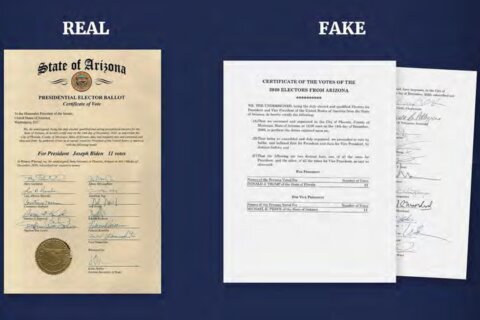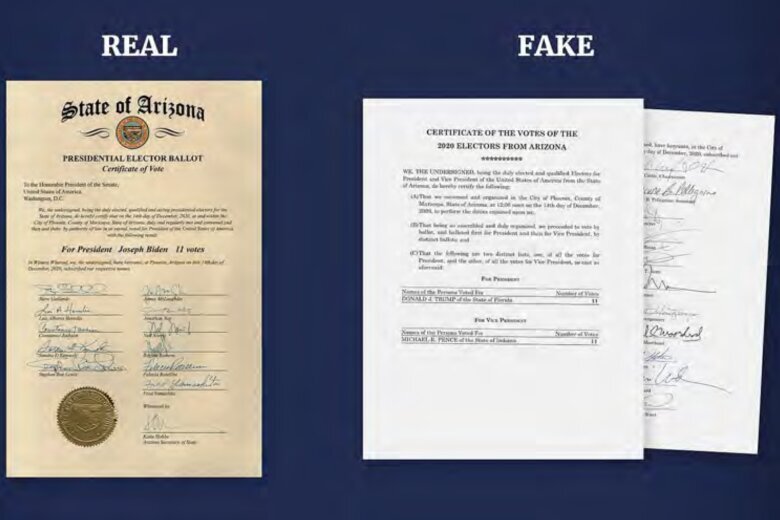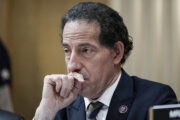
An Arizona grand jury’s indictment of 18 people who either posed as or helped organize a slate of electors falsely claiming that former President Donald Trump won the state in 2020 could help shape the landscape of challenges to the 2024 election.
The indictment issued Wednesday is part of a campaign to deter a repeat of 2020, when Trump and his Republican allies falsely claimed he won swing states, filed dozens of lawsuits unsuccessfully challenging Democrat Joe Biden’s victory and tried to get Congress to let Trump stay in power. That campaign culminated with the Jan. 6, 2021, attack on the U.S. Capitol.
The penalties piling up for that push include lawyers who helped Trump being censured,sanctioned and recommended for disbarment. Added to that are multimillion-dollar libelpenalties and now criminal charges in four states for spreading lies about the 2020 election. That effort included submitting fake electors contending that Trump had actually won the states and that Congress should recognize them rather than the electors won by Biden.
“People are going to have to think twice about doing things to undermine the election,” said David Becker, founder of the Center for Election Innovation & Research and coauthor of “The Big Truth,” about the danger of 2020 election deniers. “The deterrent effect is real.”
Trump himself faces federal charges for his effort to overturn the election as well as a separate indictment out of Fulton County, Georgia. On Thursday, the Supreme Court heard arguments over Trump’s contention that he should be immune from prosecution for his acts while serving as president. Though justices seemed poised to reject that contention, several signaled reservations over the federal charges that could delay the case until after the November election.
Justin Levitt, a former Department of Justice official who also worked in the Biden White House, noted the differing pace of consequences for Trump and for those whom he called the former president’s “lieutenants” in the challenges to the 2020 election results.
“One of the things that fosters deterrence most is swiftness and severity,” Levitt said. “Though the wheels of justice are turning slow, they are turning, and we are seeing consequences for the lieutenants in this conspiracy.”
Some of the broadest consequences may have come in the indictments of so-called fake electors in Arizona, Michigan and Nevada, all states with Democratic attorneys general. Several people targeted in the wide-ranging Georgia indictment also were charged relating to a fake elector scheme.
The 18 people indicted in Arizona include Trump’s former chief of staff, Mark Meadows, former New York Mayor Rudolph Giuliani and Christina Bobb, a lawyer who was recently appointed the Republican National Committee’s head of “Election Integrity.” Trump was listed as an unindicted co-conspirator.
“This is not some kind of a game. This is not some sort of fantasy football league,” Adrian Fontes, Arizona’s Democratic Secretary of State, said in an interview Thursday. “This is real life, and bad acts have real potential bad consequences.”
The breadth of the Arizona indictment, announced by state Attorney General Kris Mayes, led to sharp criticism from some out-of-state defendants.
“The phenomenon of partisan ‘lawfare’ grows more troubling by the day,” said Charles Burnham, an attorney for attorney John Eastman, who advised Trump on his 2020 legal fight and faces possible disbarment in California and more criminal charges in Georgia.
It comes after indictments of the 16 alleged Trump electors who claimed their candidate won Michigan, the six in Nevada and three in the Fulton County case in Georgia.
In a speech in Georgia earlier this year, Eastman noted how the phony Trump electors in Wisconsin had to agree that Biden won the state and promise not to serve as electors in 2024 as a condition of settling a civil lawsuit brought by two Democrats. He portrayed it as part of a sweeping effort to squelch dissent over the 2020 election — even though reviews, recounts and audits in all the swing states where Trump disputed his loss all affirmed Biden’s win.
“The government has spoken, so if you don’t bend the knee we’re going to destroy you,” Eastman said.
Prosecutors have a different take on their cases.
“As we prepare for the 2024 presidential election, today’s charges are the first in an ongoing effort to not just seek justice for the wrongs of the past, but to ensure they do not happen again,” Michigan Attorney General Dana Nessel said in a statement last year when her office filed its charges.
Beyond the indictments, Congress took a significant step in cutting off further avenues for electoral mischief. A bipartisan bill signed by Biden in 2022 makes it harder to submit rival slates of electors, requiring that only ones certified by a state’s governor go to Congress for certification.
“The possibility of alternate electors has narrowed incredibly,” said Edward B. Foley, a law professor at The Ohio State University.
The 65 Project is an organization formed to pursue legal discipline against lawyers involved in filing the dozens of unsuccessful lawsuits challenging Trump’s 2020 loss. Michael Teter, the group’s managing director, said the threat already has had an impact by lessening enthusiasm among election deniers for litigation challenging their many losses at the polls in 2022.
“I don’t think we’ll see the same sort of effort to use the legal system in 2024,” Teter said, adding that he expects Trump to challenge the results should he lose at the polls. “But I don’t think they’ll use the court system in the same way and I don’t think they’ll use a scheme like the false elector one.
“I don’t think a lot of people will want to sign up for that again.”
___
Associated Press writers Joey Cappelletti in Lansing, Michigan, and Jonathan J. Cooper in Phoenix contributed to this report.
Copyright © 2024 The Associated Press. All rights reserved. This material may not be published, broadcast, written or redistributed.







